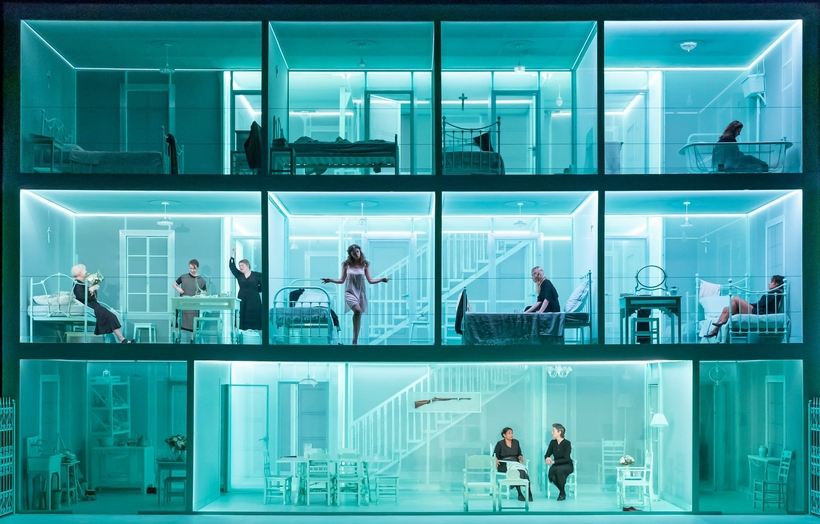“I’m not the star of this show,” says the flinty Harriet Walter in a trailer for The House of Bernarda Alba, filmed live at London’s National Theatre during a seven-week run that ended in January. “The house is what we’re talking about. And what that house represents is tradition and confinement.”
As Bernarda, Walter rules Federica García Lorca’s final tragedy like the warden of a maximum-security prison, tyrannizing five sex-starved daughters as well as her mother, who cradles a dead lamb in place of the baby boys she still longs to give birth to. In Merle Hensel’s lucid Euclidean design, the house is three stories high and two rooms deep. Gauze walls—solid and opaque to the characters’ eyes, but see-through to ours—expose everyone’s secrets, and there are many. Hats off to the director Rebecca Frecknall, whose psychological acuity matches her logistical genius—which is also on grand, gratuitous display in her immersive revival of Cabaret, newly arrived on Broadway with Eddie Redmayne from the original London cast as the phosphorescent Emcee.
To Bernarda, who is a Catholic of the deepest dye, reputation is all. Her daughters, who range in age from 39 to 20, are unmarried, consequently virgins. Oh? And what of the one who has endured years of sexual abuse at the hands of her stepfather? Not to mention the penniless youngest sister, who spends wild nights with the hound dog Pepe El Romano—never mind that he’s contracted to the sickly half-sister twice her age with the most money? Patriarchy, it’s been said, pits women against each other—even, apparently, when the patriarch is six feet under. In the house of Bernarda Alba, all are deadly enemies. “To be born a woman,” one wails, “is the worst punishment in the world.”

Walter, 73, has reigned for decades as a star of the first magnitude in classics on the London stage. Recently, her recurring roles have jolted Downton Abbey, The Crown, Patrick Melrose, Succession, Killing Eve, and who knows how many other binge-worthy TV series. To Bernarda, she brings the carriage of a frontier woman and the profile of a hawk, dealing out verbal and physical punishment with steely composure. For the moment of truth, she’s got a rifle. Alas, it backfires, metaphorically speaking, precipitating the final ironic horror.
“I am dreaming now what I lived as a child,” said Lorca, who grew up in hardscrabble Andalucía and envisioned The House of Bernarda Alba as “a photographic documentary.” Apart from a fan here and a fan there, folkloric detail interests Frecknall not at all. F-bombs explode nonstop in Alice Birch’s blistering adaptation, thoroughly in keeping with plenty of amped-up sex and violence. And while Lorca purposely focuses on the women to the exclusion of men, Frecknall lets Pepe El Romano ooze into view now and again in the silent person of James McHugh, a dancer with the brawn of a stevedore and the spine of a jaguar. Stanley Kowalski, eat your heart out!
Speaking of Stanley Kowalski, Frecknall had all London at fever pitch last year when she cast Paul Mescal in A Streetcar Named Desire. Her stock is through the roof.
The House of Bernarda Alba is available for streaming on the National Theatre at Home Web site
Matthew Gurewitsch writes about opera and classical music for AIR MAIL. He lives in Hawaii

